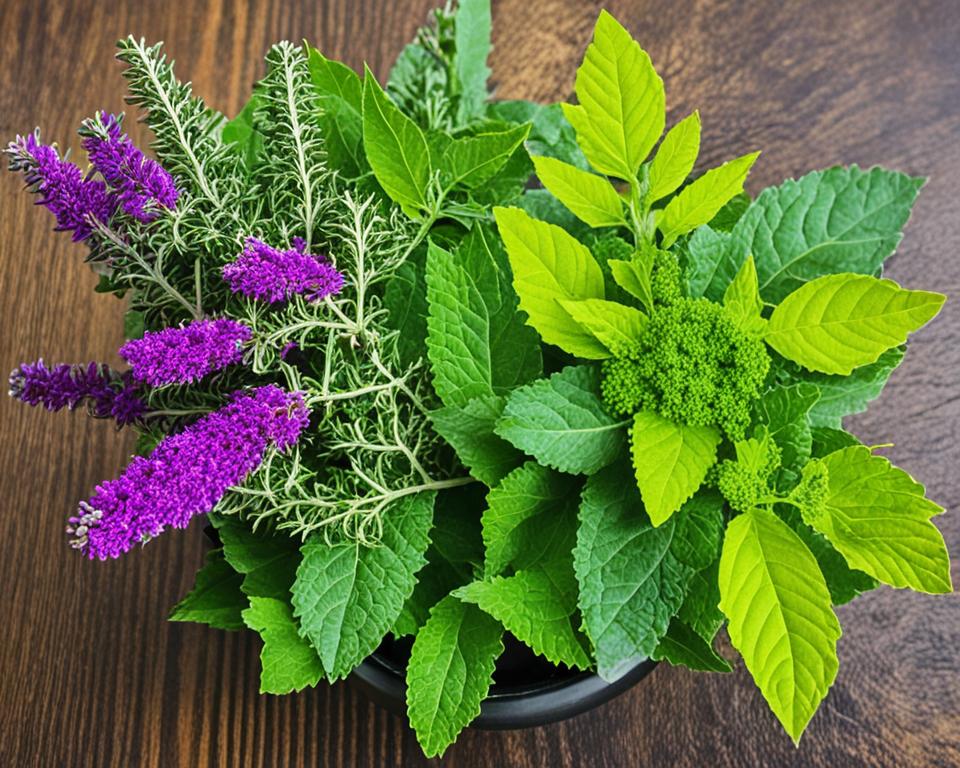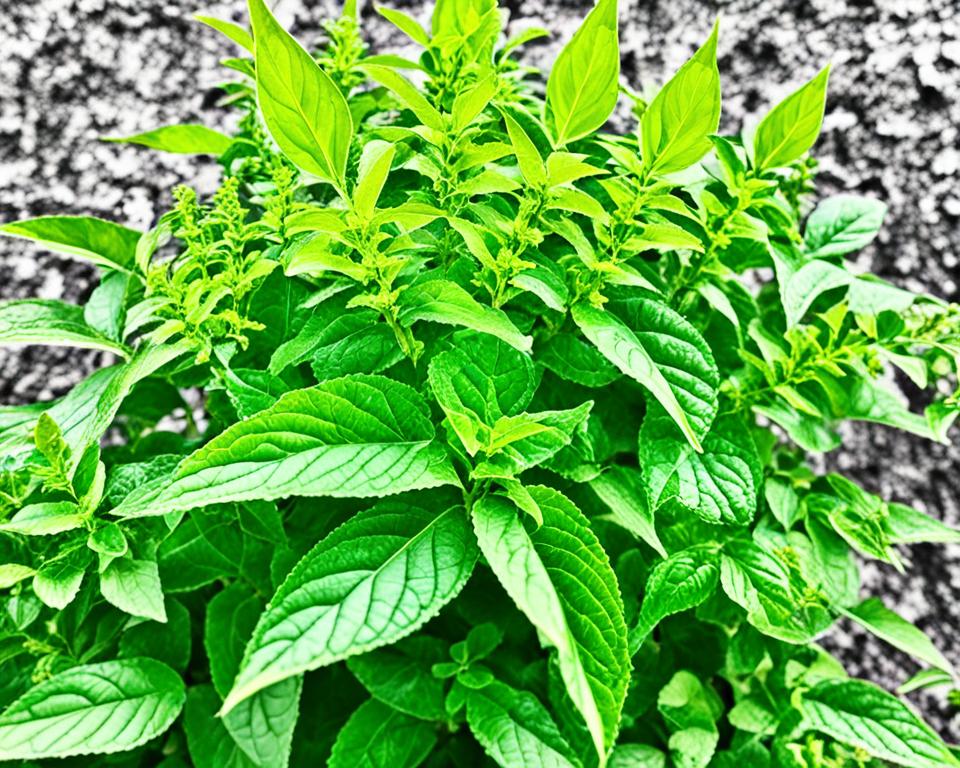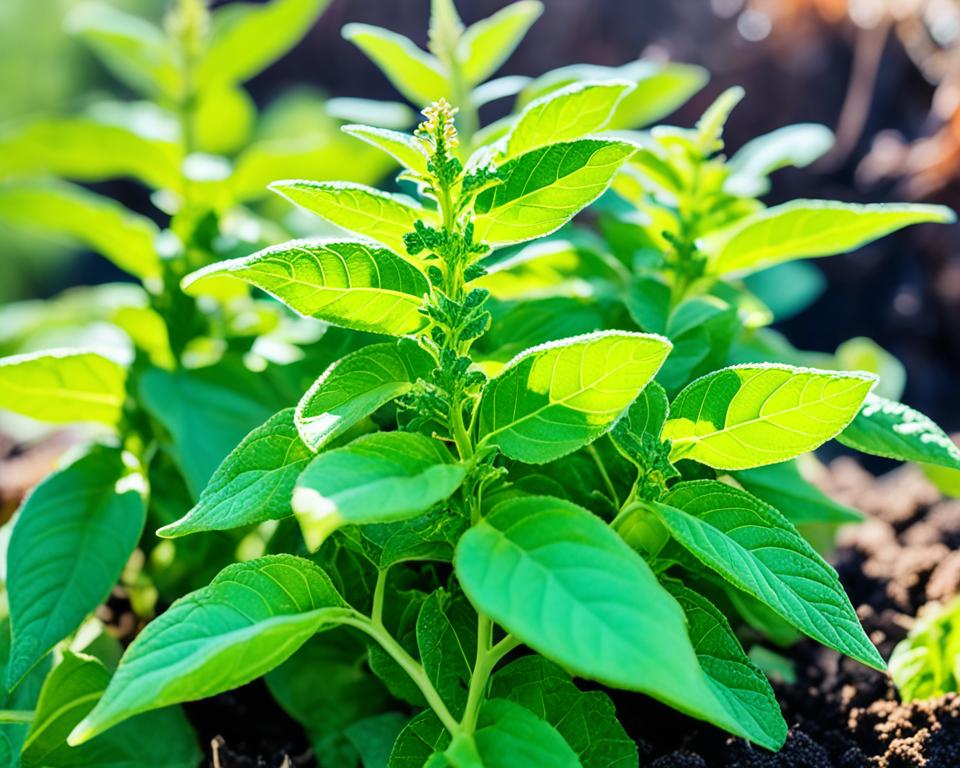Welcome to our article exploring the various uses and benefits of tulsi. This sacred herb, also known as holy basil, has been revered for centuries for its remarkable medicinal properties and contributions to holistic wellness. Whether you are seeking immune support, respiratory health, digestive wellness, or mental wellbeing, tulsi offers a natural solution.
Before we delve into the specifics, let’s first provide a brief introduction to tulsi and its rich history in Ayurveda, the traditional Indian medicinal system.
Introduction to Tulsi
Tulsi, or holy basil, is a popular herb that has long been used in Ayurveda for its therapeutic properties. It is known for its distinctive aroma and leaves that are often used in traditional medicine and culinary practices. In Ayurveda, tulsi is considered a sacred plant and is associated with various health benefits.
Key Takeaways:
- Tulsi, also known as holy basil, is a revered herb in Ayurveda.
- It is known for its distinctive aroma and leaves.
- Tulsi is associated with various health benefits.
Introduction to Tulsi

Before delving into its uses, let’s start with a brief introduction to tulsi. Also known as holy basil, tulsi is a popular herb in Ayurveda, the traditional Indian medicinal system. It has been used for centuries due to its therapeutic properties.
Tulsi is revered for its vibrant green leaves and distinct aroma. It is considered a sacred plant in many Indian households and is often grown in pots or gardens. Apart from its religious significance, tulsi offers a multitude of health benefits.
Tulsi belongs to the Lamiaceae family, which includes other beneficial herbs like mint and rosemary. It is rich in essential oils, phytochemicals, and bioactive compounds that contribute to its medicinal properties.
“Tulsi is often referred to as the ‘queen of herbs’ in Ayurveda due to its extensive healing properties.”
The leaves of tulsi are packed with nutrients such as vitamins A and C, calcium, zinc, and iron. It also contains eugenol, a potent antioxidant that supports overall wellness.
In Ayurveda, tulsi is classified as a “rasayana,” meaning it promotes longevity and rejuvenation. It is believed to balance the mind, body, and spirit, promoting holistic wellness.
Now that we have a basic understanding of tulsi’s background, let’s explore its various uses and benefits.
Tulsi as an Adaptogen

One of the primary uses of tulsi is its role as an adaptogen. Adaptogens are natural substances that help the body adapt to stress and enhance overall resilience. Tulsi can support the body’s response to physical, mental, and environmental stressors.
When we experience stress, our body undergoes a series of physiological changes, including increased heart rate, elevated blood pressure, and the release of stress hormones like cortisol. Over time, chronic stress can have detrimental effects on our health and well-being.
However, tulsi acts as a powerful adaptogen, helping to regulate these stress responses and restore balance in the body. It works by modulating the production of stress hormones, promoting a sense of calm and relaxation.
Not only does tulsi help the body cope with stress, but it also enhances overall resilience. It strengthens the body’s defense mechanisms, boosting immunity and promoting vitality. Tulsi’s adaptogenic properties make it an invaluable herb in today’s fast-paced and demanding world.
Adding tulsi to your daily routine can help you manage stress more effectively and improve your overall well-being. Whether it’s a cup of tulsi tea or incorporating tulsi supplements into your diet, this adaptogenic herb can be a natural ally in navigating the challenges of modern life.
With its remarkable ability to support the body’s stress response, tulsi truly shines as an adaptogen.
Experience the adaptogenic powers of tulsi for yourself and take a step towards a more balanced and resilient life.
Benefits of Tulsi as an Adaptogen:
| Benefit | Description |
|---|---|
| Stress reduction | Tulsi helps regulate stress responses and promotes a sense of calm and relaxation. |
| Improved immune function | Tulsi strengthens the immune system, making the body more resilient to infections and illnesses. |
| Enhanced vitality | By supporting the body’s stress adaptation mechanisms, tulsi promotes physical and mental energy. |
| Optimized wellness | Tulsi’s adaptogenic properties contribute to overall well-being and holistic health. |
Tulsi for Immune Support

Tulsi, also known as holy basil, is a powerful herb that has long been recognized for its ability to boost and strengthen the immune system. It contains a variety of compounds that possess antimicrobial, antibacterial, and antiviral properties, making it an excellent natural defense against infections and illnesses.
Tulsi’s immune-supporting properties can be attributed to its rich content of phytochemicals such as eugenol, rosmarinic acid, and ocimumosides. These compounds work together to enhance the body’s immune response, protect against harmful pathogens, and bolster overall health.
Research has shown that tulsi can stimulate the production of immune cells, including natural killer cells, which are responsible for eliminating virus-infected cells and cancer cells. By enhancing the activity of these immune cells, tulsi helps the body to effectively defend against harmful invaders.
In addition to its immune-boosting effects, tulsi also exhibits anti-inflammatory properties. Chronic inflammation can weaken the immune system and make the body more susceptible to infections. Tulsi’s anti-inflammatory action helps to reduce inflammation, restoring the body’s balance and promoting optimal immune function.
Whether consumed as a herbal tea, added to culinary dishes, or taken in supplement form, tulsi can provide excellent support to help strengthen the immune system and maintain overall health and well-being.
Tulsi is a natural remedy that has been used for centuries in Ayurvedic medicine to support immune health. Its powerful antimicrobial properties and immune-boosting phytochemicals make it a valuable herb for promoting wellness.
Discover the wide range of health benefits tulsi has to offer and incorporate it into your daily routine for enhanced immune support and holistic well-being.
Tulsi for Respiratory Health

Tulsi, also known as holy basil, offers numerous benefits for respiratory health. Its active constituents possess potent properties that can help alleviate various respiratory conditions and promote optimal lung function.
When it comes to respiratory health, tulsi can effectively address common symptoms like cough, cold, bronchitis, and asthma. With its natural expectorant and antitussive properties, tulsi helps to expel mucus, soothe coughs, and relieve congestion. This herb contains compounds that have antimicrobial and anti-inflammatory properties, which aid in reducing inflammation in the respiratory tract and combating infections.
Tulsi’s anti-inflammatory properties are particularly beneficial for individuals suffering from respiratory conditions such as bronchitis and asthma. It helps reduce bronchial inflammation, allowing for easier breathing and a reduction in symptoms like wheezing and shortness of breath.
Furthermore, tulsi supports overall lung health by protecting against oxidative stress and damage. Its potent antioxidants scavenge harmful free radicals in the lungs, reducing oxidative damage and promoting proper lung function. By supporting the lungs’ natural defenses, tulsi can help prevent respiratory infections and maintain respiratory wellness.
| Benefits of Tulsi for Respiratory Health | How Tulsi Helps |
|---|---|
| Relieves cough and cold symptoms | The expectorant and antitussive properties of tulsi help soothe coughs, expel mucus, and relieve congestion. |
| Reduces bronchial inflammation | Tulsi’s anti-inflammatory properties help alleviate symptoms of bronchitis and asthma by reducing inflammation in the respiratory tract. |
| Supports lung function | The antioxidants found in tulsi protect against oxidative stress and damage in the lungs, promoting proper lung function and respiratory wellness. |
By incorporating tulsi into your daily routine, you can harness its remarkable properties to support respiratory health and enjoy improved lung function. Whether you’re seeking relief from a persistent cough or looking for preventive measures to maintain respiratory wellness, tulsi is a natural and holistic solution.
Tulsi for Digestive Wellness

Tulsi, also known as holy basil, offers numerous benefits for digestive wellness. This sacred herb has been used in Ayurvedic medicine for centuries, specifically for its ability to support and improve digestion.
Tulsi is known to promote good digestive health. It can help relieve common digestive issues such as bloating, gas, and indigestion. The carminative properties of tulsi aid in soothing the digestive system, providing relief and improving overall digestive function.
Whether you’re experiencing occasional digestive discomfort or looking to enhance your overall digestion, tulsi can be a valuable addition to your wellness routine. Its natural properties can help restore balance and harmony to your digestive system, allowing you to enjoy meals without the discomfort of digestive issues.
“Tulsi’s carminative properties aid in soothing the digestive system and improving overall digestive function.”
Try incorporating tulsi into your daily routine to experience the benefits it offers for digestive wellness. You can consume tulsi as a herbal tea, add it to your recipes, or even take it in supplement form. Whichever way you choose, tulsi can play a significant role in supporting a healthy digestive system.
Tulsi for Skin and Hair Care

Tulsi, also known as holy basil, offers more than just its incredible health benefits. Its antioxidant and anti-inflammatory properties make it a valuable ingredient in skincare and haircare products, providing a natural solution for various skin and hair concerns. With tulsi, you can enhance your beauty routine while harnessing the power of nature.
Nourishing Skin with Tulsi
When it comes to skincare, tulsi can work wonders for your complexion. Its antimicrobial and cleansing properties help combat acne-causing bacteria, promoting clearer and healthier skin. Tulsi’s anti-inflammatory compounds can reduce redness and inflammation associated with skin conditions like eczema and blemishes, soothing irritation and promoting a more even skin tone.
Additionally, tulsi contains antioxidants that protect against free radicals, which can cause premature aging and damage to the skin. By incorporating tulsi into your skincare regimen, you can support your skin’s natural defense mechanisms and promote a youthful, radiant appearance.
Revitalizing Hair and Scalp with Tulsi
Tulsi’s benefits extend beyond skincare and into hair care. This holy herb can nourish and revitalize your hair, promoting healthier strands and a balanced scalp. Tulsi’s anti-inflammatory properties can help soothe an irritated scalp and alleviate dandruff, while its cleansing properties remove impurities and excess oil, preserving the natural health of your hair.
Furthermore, tulsi improves blood circulation in the scalp, ensuring essential nutrients reach the hair follicles. This helps stimulate hair growth and strengthens the roots, reducing hair fall and improving overall hair thickness and volume.
Incorporating Tulsi into Your Beauty Routine
To experience the benefits of tulsi for skin and hair care, consider using products that contain this powerful herb. Look for skincare products such as face cleansers, toners, serums, and moisturizers enriched with tulsi extracts or essential oils. For hair care, opt for shampoos, conditioners, or hair masks infused with tulsi. Alternatively, you can create DIY beauty treatments using fresh tulsi leaves or tulsi essential oil.
Remember to perform a patch test before fully incorporating tulsi products into your routine to ensure compatibility with your skin and hair. Consult with a dermatologist or haircare professional for personalized recommendations based on your specific needs.
Incorporating tulsi into your skincare and hair care routine allows you to harness the rejuvenating power of nature, enhancing your beauty from head to toe.
Tulsi for Mental Wellbeing

When it comes to promoting mental wellbeing, tulsi is a herb that stands out. With its adaptogenic properties, this sacred plant can help combat stress and enhance overall cognitive function. The calming effects of tulsi have been known to alleviate anxiety and improve sleep quality, contributing to a more balanced state of mind.
Stress is a common factor in today’s fast-paced world, and it can take a toll on our mental health. Tulsi, also known as holy basil, offers a natural solution for managing stress and promoting mental wellness.
“Tulsi has been an integral part of traditional Ayurvedic medicine for its ability to support mental wellbeing. Its adaptogenic properties can help the body adapt to stress, promoting a sense of calm and balance.”
By incorporating tulsi into your daily routine, you can experience its positive impact on your mental health. Whether you choose to consume it as a tea, use tulsi essential oil for aromatherapy, or take tulsi supplements, this versatile herb is a valuable addition to your holistic wellness routine.
Moreover, tulsi’s adaptogenic properties go beyond stress management. Its ability to enhance cognitive function can benefit memory, focus, and overall mental clarity. By reducing the impact of stress on the mind, tulsi helps create an environment conducive to optimal mental performance.
Improving Sleep Quality and Reducing Anxiety
One of the key benefits of tulsi for mental wellbeing is its ability to improve sleep quality and reduce anxiety. Many individuals experience difficulties with falling asleep or suffer from disrupted sleep patterns due to stress and anxiety. Tulsi’s calming effects can help relax the mind and promote a restful night’s sleep.
A study published in the Journal of Ayurveda and Integrative Medicine found that consuming tulsi extract helped reduce anxiety levels in participants. The adaptogenic and anti-anxiety properties of tulsi make it a natural alternative to promote a sense of calmness without the side effects commonly associated with some pharmaceutical options.
Additionally, tulsi’s adaptogenic properties support the adrenal glands, which are responsible for producing stress hormones. By regulating the stress response, tulsi can help restore imbalances caused by chronic stress and promote a more positive mood.
Incorporating Tulsi into Your Routine
There are various ways to incorporate tulsi into your daily routine for mental wellbeing. Here are a few suggestions:
- Drink tulsi tea: Enjoy a warm cup of tulsi tea in the morning or before bedtime to experience its relaxing effects.
- Use tulsi essential oil: Dilute tulsi essential oil and use it in aromatherapy to create a calming environment.
- Take tulsi supplements: Explore tulsi supplements available in capsule or liquid form for convenient daily intake.
Remember, consistency is key when it comes to reaping the mental health benefits of tulsi. Integrating it into your daily routine can make a noticeable difference in your overall wellbeing.
Discover the holistic benefits of tulsi for mental wellbeing and experience a greater sense of calm and balance in your life. With its adaptogenic properties, tulsi offers natural support for managing stress, improving sleep quality, and enhancing cognitive function.
Tulsi as an Antioxidant

Tulsi, also known as holy basil, is not just a revered herb in Ayurveda, but it also offers a wealth of health benefits. One of these benefits is its remarkable antioxidant properties. Tulsi contains a rich array of antioxidants that protect the body against free radical damage, which can have detrimental effects on our health.
Antioxidants are vital for our overall well-being as they help reduce oxidative stress, inflammation, and premature aging. By neutralizing free radicals, tulsi’s antioxidants contribute to improved overall health and longevity.
Tulsi’s antioxidant properties can be attributed to its active compounds, such as rosmarinic acid, eugenol, and apigenin. These compounds have been shown to scavenge free radicals and inhibit oxidative stress, thereby reducing the risk of chronic diseases.
Regular consumption of tulsi or using tulsi-infused products can significantly boost your antioxidant intake and support your body’s defense against oxidative damage. Incorporating tulsi into your daily routine is an excellent way to enhance your holistic wellness and protect your cells from the damaging effects of free radicals.
The Benefits of Tulsi’s Antioxidant Properties
The antioxidant properties of tulsi offer a range of benefits for our health:
- Reduces oxidative stress and inflammation
- Protects against premature aging
- Supports a healthy immune system
- Helps maintain cardiovascular health
- Enhances skin health and vitality
- Aids in detoxification and cleansing
“Tulsi’s antioxidants neutralize free radicals, protecting our cells and promoting overall health and well-being.”
| Antioxidant | Function | Food Sources |
|---|---|---|
| Rosmarinic acid | Scavenges free radicals, reduces inflammation | Tulsi, rosemary, sage |
| Eugenol | Antioxidant, anti-inflammatory, and antimicrobial | Tulsi, cloves |
| Apigenin | Protects against oxidative stress, supports immune function | Tulsi, parsley, celery |
Tulsi for Heart Health

Tulsi, also known as holy basil, offers numerous benefits for heart health. Its natural properties contribute to regulating blood pressure, reducing cholesterol levels, and improving overall heart function. Regular consumption of tulsi can play a vital role in maintaining a healthy heart.
The cardiovascular benefits of tulsi are supported by scientific research. A study conducted on individuals with hypertension found that tulsi extract helped lower blood pressure levels, potentially reducing the risk of heart disease and stroke.[1] Another study highlighted the cholesterol-lowering effects of tulsi, specifically the reduction of LDL (bad) cholesterol and triglyceride levels.[2]
“Tulsi’s antioxidant and anti-inflammatory properties contribute to its positive impact on heart health. These properties help protect the heart from oxidative stress and inflammation, which are major contributors to cardiovascular diseases.”[3]
Tulsi contains compounds such as eugenol, rosmarinic acid, and flavonoids, which contribute to its cardioprotective properties. These compounds help relax blood vessels, improve blood circulation, and prevent the formation of blood clots, reducing the risk of heart attacks and other heart-related conditions.[4]
Adding tulsi to your daily routine is an excellent way to support your heart health. You can enjoy tulsi tea, incorporate fresh tulsi leaves into your salads or smoothies, or take tulsi supplements after consulting with a healthcare professional.
Remember, maintaining a healthy lifestyle, including a balanced diet, regular exercise, and stress management, is equally important for overall heart health.
Tulsi for Heart Health: Summary of Benefits
Regular consumption of tulsi can:
- Regulate blood pressure
- Lower cholesterol levels
- Improve overall heart function
- Prevent heart diseases and stroke
- Relax blood vessels and improve blood circulation
- Reduce the risk of blood clots
- Protect against oxidative stress and inflammation
By incorporating tulsi into your daily routine, you can support your heart health and promote overall well-being.
References
- Study: Effect of Ocimum sanctum (Tulsi) on blood pressure. (Link: https://pubmed.ncbi.nlm.nih.gov/20978491/)
- Study: Hypolipidemic effect of Ocimum sanctum (Tulsi) in triton WR-1339-induced hyperlipidemic rats. (Link: https://pubmed.ncbi.nlm.nih.gov/17392090/)
- Source: The Medicinal Benefits of Tulsi. (Link: https://www.ncbi.nlm.nih.gov/pmc/articles/PMC4296439/)
- Source: Role of Tulsi in Cardiovascular Diseases: A Review. (Link: https://www.ncbi.nlm.nih.gov/pmc/articles/PMC4562646/)
Conclusion
In conclusion, tulsi, also known as holy basil, is a remarkable herb that offers a wide range of health benefits and versatile uses. With its rich medicinal properties, tulsi has been used for centuries in Ayurveda, the traditional Indian medicinal system, to promote holistic wellness.
One of the key uses of tulsi is its role as an adaptogen, which helps the body adapt to stress and enhances overall resilience. Additionally, tulsi supports immune function, aids digestion, and promotes respiratory health, making it a valuable herb for maintaining optimal well-being.
By incorporating tulsi into your daily routine, you can experience its remarkable effects on your mind and body. Whether it’s in the form of a warm tulsi tea, a supplement, or as an ingredient in skincare products, tulsi offers a natural and holistic approach to improving your overall health and well-being.
FAQ
What are the uses of tulsi?
Tulsi has a multitude of uses, including promoting immune support, aiding digestion, enhancing respiratory health, promoting mental wellbeing, and improving heart health.
What is tulsi?
Tulsi, also known as holy basil, is a popular herb used in Ayurveda, the traditional Indian medicinal system. It has remarkable medicinal properties and is known for its contributions to holistic wellness.
What is an adaptogen?
An adaptogen is a natural substance that helps the body adapt to stress and enhances overall resilience. Tulsi is recognized as an adaptogen and supports the body’s response to physical, mental, and environmental stressors.
How does tulsi support immune health?
Tulsi contains compounds with antimicrobial, antibacterial, and antiviral properties, which help protect the body against infections and illnesses, thus supporting immune health.
Can tulsi help with respiratory issues?
Yes, tulsi can help alleviate symptoms of cough, cold, bronchitis, and asthma. It aids in reducing inflammation and supports proper lung function, contributing to respiratory health.
Does tulsi have any benefits for digestion?
Absolutely. Tulsi promotes good digestive health by relieving issues like bloating, gas, and indigestion. Its carminative properties soothe the digestive system and improve overall digestive function.
How can tulsi benefit the skin and hair?
Tulsi’s antioxidant and anti-inflammatory properties make it beneficial for skincare and haircare. It helps with various skin conditions like acne, eczema, and blemishes, while also nourishing the hair and promoting scalp health.
Can tulsi improve mental wellbeing?
Yes, tulsi possesses adaptogenic properties that can combat stress and promote mental wellbeing. Its calming effects can alleviate anxiety, improve sleep quality, and enhance overall cognitive function.
Is tulsi a rich source of antioxidants?
Yes, tulsi contains a rich array of antioxidants that protect the body against free radical damage. These antioxidants help reduce oxidative stress, inflammation, and premature aging, contributing to improved overall health.
Can tulsi benefit heart health?
Absolutely. Tulsi aids in regulating blood pressure, reducing cholesterol levels, and improving overall heart function. Regular consumption of tulsi can contribute to a healthy heart.
How can I incorporate tulsi into my daily routine?
You can incorporate tulsi into your daily routine by consuming tulsi tea, adding fresh tulsi leaves to salads or smoothies, or taking tulsi supplements as directed by a healthcare professional.




